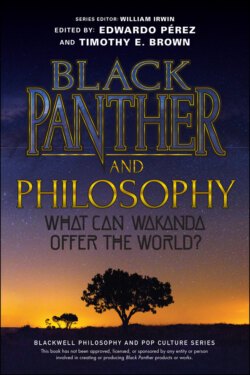Читать книгу Black Panther and Philosophy - Группа авторов - Страница 30
T’Chaka’s Isolationism and Active Ignorance
ОглавлениеT’Challa loved his father, but he never really knew him, and in his ignorance he was not alone. King T’Chaka kept nearly all Wakandans in the dark about what happened in Oakland and about the boy he left there. “We had to maintain the lie,” Zuri explains to an unconvinced T’Challa. Or as T’Chaka himself says of his decision to abandon his brother’s son, “He was the truth I chose to omit.”
This was his political philosophy and his epistemology, isolationism and ignorance as two sides of one coin. Whatever else he accomplished as king, T’Chaka produced what the historian of science Robert Proctor calls ignorance as an active construct12 : a kind of not-knowing, though not because life is short and there is just so much to know. With active ignorance, the not-knowing is the point. Sometimes we actively construct our own ignorance, but here T’Chaka is more like tobacco companies that worked for decades to manufacture public doubt about cigarettes, cancer, and addiction.13 He knows full well what he’s done, but thinks protecting his people means hiding the truth from them.
T’Chaka constructs public ignorance to uphold an isolationist vision for Wakanda. Think about W’Kabi’s advice to T’Challa on the question of aiding the world. “You let the refugees in, they bring their problems with them, and then Wakanda is like everywhere else.” Yet “their” problems are Wakanda’s problems too. The abandoned N’Jadaka is the truth T’Chaka chose to omit, a truth hidden from W’Kabi and other Wakandan isolationists – that “our” people are out there too. This is what the journalist Adam Serwer identifies as Black Panther’s central theme of Pan-Africanism: “a belief that no matter how distant black people’s lives and struggles are from each other, we are in a sense ‘cousins’ who bear a responsibility to help one another escape oppression.”14
